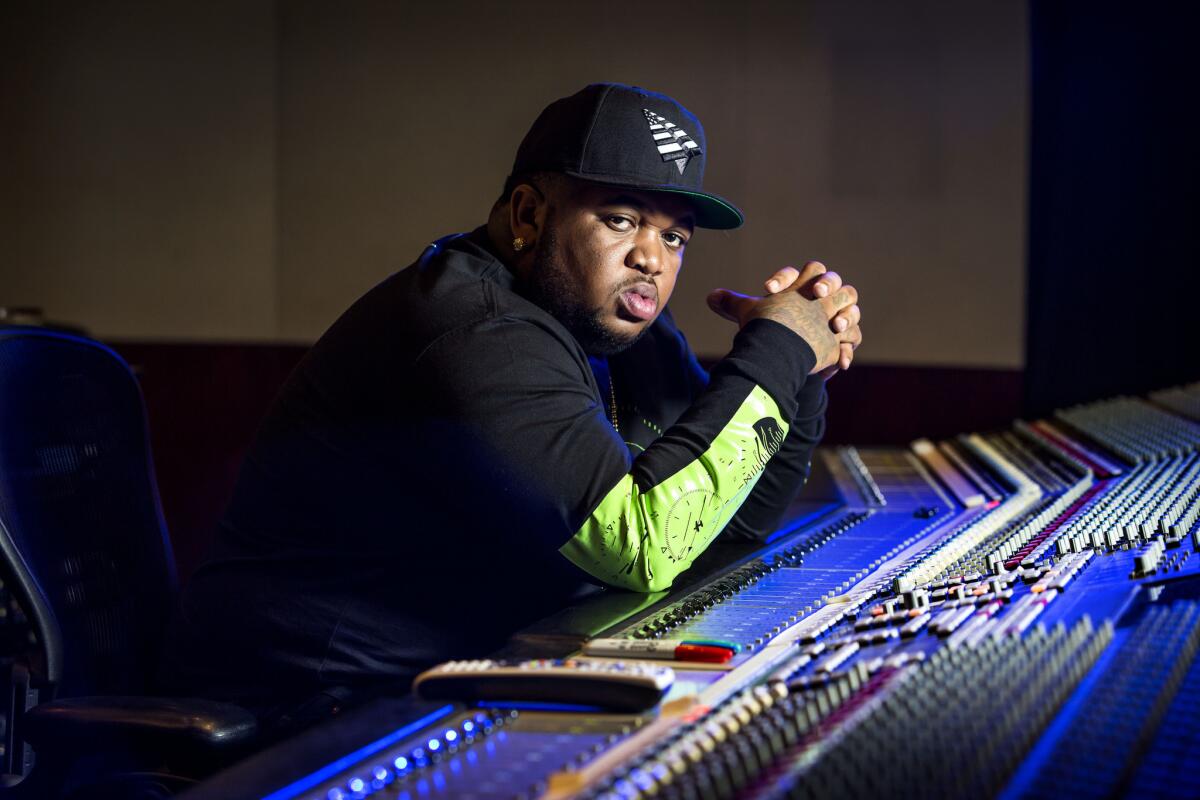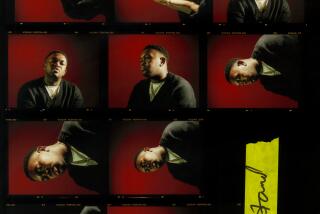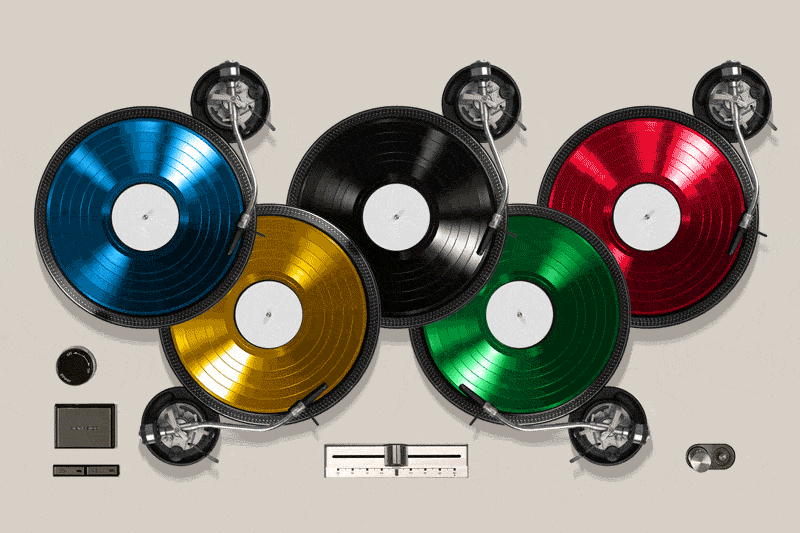DJ Mustard sets the beat for mainstream hip-hop and R&B

- Share via
On a quiet Tuesday night in September, in an overly air-conditioned Mid-City recording studio, DJ Mustard was alone and preparing to work.
The L.A.-based producer, one of the defining figures in hip-hop at the moment, is known for his stark and club-ready sound commonly called “ratchet” as heard on rap-radio staples by YG, Ty Dolla Sign, Trey Songz and scores of others. His songs use simple, spacious synth figures and looming bass notes, played at a midtempo pace right between party music and slow-rolling street vibes. That night, he had a song for Rihanna that was coming due, and he needed to finish the beat.
But before starting the night’s edits, he warmed up by watching a few amateur fight videos on the popular site World Star Hip-Hop, including one in which a small crowd of skateboarders whacked at one another over cheers and moans from the audience. As he called up production software on his computer, the quiet and unfailingly polite Mustard asked the studio’s assistant to order him a takeout Caesar salad.
“I don’t want any croutons,” Mustard said, then rattled off a list of almost half a dozen toppings he wanted excised from the meal.
A chilly studio, full of rowdiness punctuated by purposeful minimalism: There’s an appropriate start for a night with DJ Mustard.
The 24-year-old DJ and producer born Dijon McFarlane has, over the last two years, become perhaps the most important beatmaker in mainstream hip-hop and R&B. While peers like Mike Will Made It and Boi-1da have also melded hip-hop tones with pop-hit melody, few can match Mustard’s hits-to-misses ratio. From Tyga’s “Rack City” to 2 Chainz’s “I’m Different” to Tinashe’s “2 On,” it’s impossible to imagine rap radio today without his digital drum patter, chanted “Hey!” samples and minor-key arrangements that can make a turned-up nightclub feel almost eerie.
Although he came to fame alongside fellow L.A. artists like his old friends YG and Ty Dolla Sign, he’s now a rare producer — like hitmakers Timbaland or Pharrell Williams before him — with as much personality and presence as his artists.
“There was a point where a third to a half of our playlist was produced by DJ Mustard,” said Emmanuel Coquia, music director at Power 106-FM, the influential L.A. hip-hop station. “His sound is the sound of Power 106, and the sound of hip-hop right now.”
His only problem? Right now he might be almost too successful. His “Mustard on the beat” call sign introducing all his singles has become so frequent on radio that the mercurial hip-hop scene already seems primed for something new.
“People think it’s easy. Well, can you sell a million records with five sounds?” Mustard said. But at the same time, he knows that those five sounds have to change with the times.
To prove his range as a producer and performer, he released a low-key and more experimental solo LP, “10 Summers,” in August, and just wrapped up a tour opening for the dubstep stadium-filler Skrillex. Mustard’s job as a producer will be to deliver something new — before someone else does.
“I just want to show people I can do more than anybody thought. I produce music, it’s so much more than just making beats. When I’m in a room with a band, I’m telling them how to play.”
The bare simplicity of his rhythms and the open spaces of his productions means that all sorts of song ideas can work around them, and he’s eager to explore that potential.
For Tinashe, the L.A. R&B singer who turned a lean and spooky Mustard beat into one of the year’s most popular singles “2 On,” collaborating with Mustard opened all kinds of possibilities.
“The fact that I was the first female on a DJ Mustard beat was a big deal,” she said. The tune’s haunting sub-bass and bummer-funk keyboard riff felt like something new to both of them.
“I tried to make it sound different from everything else he’s done. It’s an intimidating beat to write to. It is so simple and repetitive, and I think that’s why it started in a rap space,” she added. “You wouldn’t expect it to go to the places it did.”
Now that Mustard has entered pop’s A-list, his vision is usually so clear that even with an artist like Rihanna, he’s free to speak up if a track doesn’t strike his ears right. “She’s kind of a different story, but yeah, you can always tell her ‘I’m not feeling that,’” Mustard said. “People usually have more respect for you when you’re being honest.”
His other distinction? Mustard is a born DJ, in the literal sense. He got his start spinning records at parties as a student at Dorsey High. He quickly learned the ways that hit songs can move bodies and how essential it was to get right to the point if you wanted to please a crowd.
“I was playing at proms before I was old enough to go to one,” he said. At this summer’s Made in America Festival at Grand Park in downtown L.A., Mustard pulled double shifts behind the decks for YG’s lively set and as the resident mixer for the venue’s skate park stage. Touring with Skrillex shifted what he thought was possible in a DJ set — that spinning records can be performative and not just facilitating a party.
Mustard cites neo-house and pop artists like Disclosure, Sam Smith and Calvin Harris as hopeful collaborations in the future. As his sound evolves, it’s easy to imagine him looking to the dance-festival stage as much as the studio for inspiration.
“I know he’s evolving his sound, expanding it and DJing and working with pop artists,” Coquia said. “That’s great for him. He doesn’t want people to just think of him just being associated with one sound.”
The young L.A. producer who has started more parties than almost any other artist in the last two years is now figuring out how to keep it going for himself.
“I love performing and seeing the reaction. I throw water, act like a rock star,” he said. “But, yeah, it’s humbling. I used to dream of being a DJ on Power 106, and now look.”
Twitter: @AugustBrown
Times staff writer Gerrick Kennedy also contributed to this report.
More to Read
The biggest entertainment stories
Get our big stories about Hollywood, film, television, music, arts, culture and more right in your inbox as soon as they publish.
You may occasionally receive promotional content from the Los Angeles Times.











